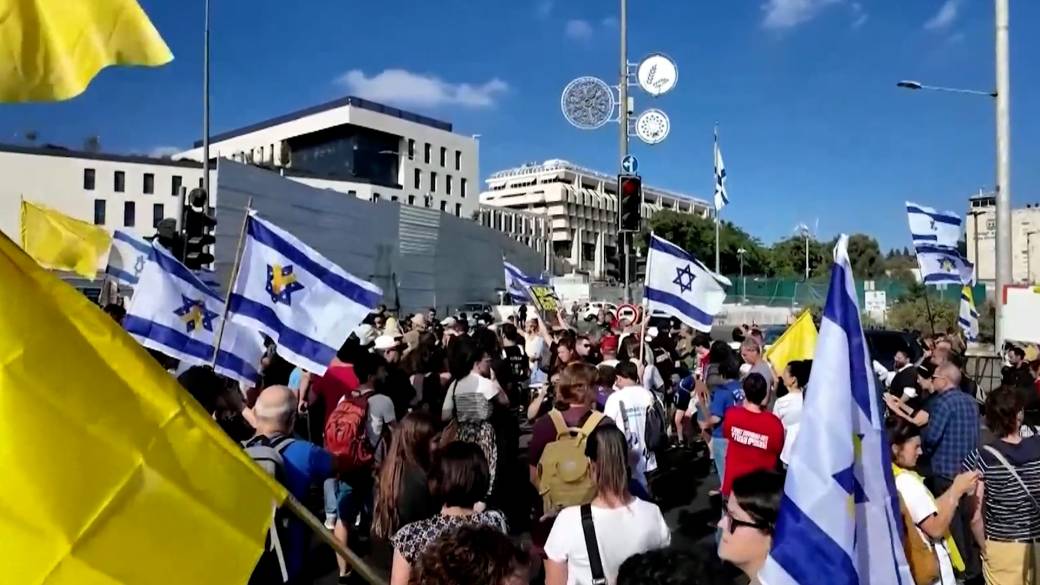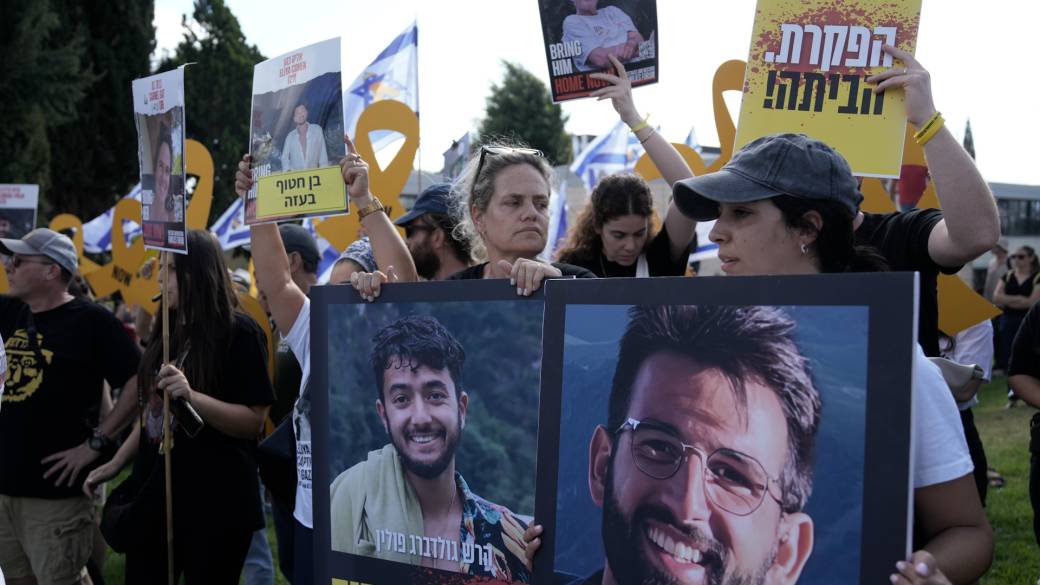Israeli Prime Minister Benjamin Netanyahu on Monday pushed back against a new wave of pressure to reach a cease-fire deal in Gaza after hundreds of thousands of Israelis protested and went on strike and U.S. President Joe Biden said he needed to do more after nearly 11 months of fighting.

In his first public address since Sunday’s mass protests showed many Israelis’ furious response to the discovery of six more dead hostages, Netanyahu said he will continue to insist on a demand that has emerged as a major sticking point in talks — continued Israeli control of the Philadelphi corridor, a narrow band along Gaza’s border with Egypt where Israel contends Hamas smuggles weapons into Gaza. Egypt and Hamas deny it.
Netanyahu called the corridor vital to ensuring Hamas cannot rearm via tunnels. “This is the oxygen of Hamas,” he said.
And he added: “No one is more committed to freeing the hostages than me. But no one will preach to me.”
Israeli Prime Minister Benjamin Netanyahu stands before a map of the Gaza Strip, telling viewers how Hamas has imported arms into the territory since Israel’s withdrawal in 2005, during a news conference in Jerusalem, Monday, Sept. 2, 2024. The Hebrew on the screen reads, “Gaza after the disengagement, oxygen pipe of Hamas”. (AP Photo/Ohad Zwigenberg, Pool).
OB
Israelis had poured into the streets late Sunday in grief and anger in what appeared to be the largest protest since the start of the current conflict. The families and much of the public blamed Netanyahu, saying the hostages could have been returned alive in a deal with Hamas. A rare general strike was held across the country on Monday.
Late Monday, several thousand demonstrators gathered outside Netanyahu’s private home in central Jerusalem, chanting, “Deal. Now.” and carrying coffins draped in the Israeli flag. Scuffles broke out when police snatched away the coffins, and several protesters were arrested. Thousands more marched outside Netanyahu’s Likud party in Tel Aviv, according to Israeli media.
But others support Netanyahu’s drive to continue the campaign in Gaza, which was triggered by Hamas’ Oct. 7 attack into Israel and has killed tens of thousands of Palestinians in the territory. Netanyahu says the assault will force militants to give in to Israeli demands, potentially facilitate rescue operations and ultimately annihilate the group.
Key ally the United States is showing impatience. Biden spoke to reporters as he arrived at the White House for a Situation Room meeting with the U.S. mediation team in the negotiations. Asked if Netanyahu was doing enough, Biden responded, “No.”
He insisted that negotiators remain “very close” to a deal, adding, “Hope springs eternal.”

Hamas has accused Israel of dragging out months of negotiations by issuing new demands, including for lasting Israeli control over the Philadelphi corridor and a second corridor running across Gaza. Hamas has offered to release all hostages in return for an end to the campaign in Gaza, the complete withdrawal of Israeli forces and the release of a large number of Palestinian prisoners, including high-profile militants — broadly the terms called for under an outline for a deal put forward by Biden in July.

Get breaking National news
For news impacting Canada and around the world, sign up for breaking news alerts delivered directly to you when they happen.
Netanyahu has pledged “total victory” over Hamas and blames it for the failure of the negotiations. On Monday, he said he is ready to carry out the first phase of the cease-fire — a plan that would include the release of some hostages, a partial pullout of Israeli troops and the release of some prisoners held by Israel. But he rejected a full withdrawal from Gaza, saying he saw no other party that could control Gaza’s borders.
Israeli media have reported deep differences between Netanyahu and top security officials, including Defense Minister Yoav Gallant, who say the time is ripe for a cease-fire.
An official confirmed a shouting match between Gallant and Netanyahu at a security cabinet meeting Thursday, where Netanyahu held a vote in favor of maintaining control over the Philadelphi corridor.
Gallant cast the lone vote against the proposal, saying Netanyahu was favoring border arrangements over the lives of hostages. The official spoke on condition of anonymity to discuss the closed-door meeting. Gallant on Sunday called on the security cabinet to overturn the decision.
Khalil al-Hayya, the Hamas official leading the negotiations, told the Qatari network Al Jazeera late Sunday that Netanyahu had deemed keeping the Philadelphi corridor “more important” than winning the hostages’ release.
Al-Hayya also said Hamas had offered “great flexibility,” including reducing its demand for 500 Palestinian prisoners to be released in exchange for each captive Israeli soldier to 50, and from 250 Palestinian prisoners for each Israeli civilian hostage to 30. He accused Israel of introducing new conditions including increasing the number of prisoners who would be deported upon release and banning the release of elderly or ill prisoners serving life sentences.
Israel said the six hostages found dead in Gaza were killed by Hamas shortly before Israeli forces arrived in the tunnel where they were held.

Hamas’ armed wing, the al-Qassam Brigades, appeared to say in a statement Monday that it now had a policy of killing any hostages that Israel tries to rescue. It said that after Israeli troops rescued four hostages in a deadly raid in June, it issued new orders to its fighters guarding hostages on how to deal with them if Israeli troops approach. It said that Netanyahu’s insistence on using military pressure instead of reaching a deal “will mean they (hostages) will return to their families in coffins.”
Three of the slain hostages were reportedly among those who would have been released in the first phase of the cease-fire proposal outlined by Biden in July.
Thousands attended the funeral Monday for one of the six, Israeli-American Hersh Goldberg-Polin. He was one of the best-known hostages, with his parents leading a high-profile campaign for the captives’ release, meeting with Biden and Pope Francis and addressing the Democratic National Convention last month.
“Sorry Hersh, sorry we couldn’t bring you back alive,” Israel’s President Isaac Herzog said in a eulogy.
The general strike, called by Israel’s largest trade union, the Histadrut, ended early after a labor court accepted a petition from the government calling it politically motivated.
It was the first such strike since the start of the current conflict, aiming to shut down or disrupt major sectors of the economy, including banking and health care. Some flights at Israel’s main international airport, Ben-Gurion, either departed early or were slightly delayed.
“There’s no need to punish the whole state of Israel because of what is happening, overall, it is a victory for Hamas,” said one passenger, Amrani Yigal.
But in Jerusalem, resident Avi Lavi said that “I think this is fair, the time has come to stand and to wake up, to do everything for the hostages to come back alive.”
Travelers are seen at Ben Gurion International Airport near Tel Aviv, Israel, Monday Sept. 2, 2024. Outgoing flights at the airport were halted for two hours on Monday morning as part of a general strike launched in response to the deaths of hostages held in Gaza. (AP Photo/Ohad Zwigenberg).
Municipalities in Israel’s populated central area, including Tel Aviv, participated. Others, including Jerusalem, did not.
Some 250 hostages were taken on Oct. 7. More than 100 were freed during a cease-fire in November in exchange for the release of Palestinians imprisoned by Israel. Eight have been rescued by Israeli forces. Israeli troops mistakenly killed three Israelis who escaped captivity in December.
Roughly 100 hostages remain in Gaza, a third of whom are believed to be dead.
Hamas-led militants killed some 1,200 people, mostly civilians, when they stormed into southern Israel on Oct. 7. Israel’s retaliatory offensive in Gaza has killed over 40,000 Palestinians, according to Hamas health officials, who do not say how many were militants.
The conflict has displaced the vast majority of Gaza’s 2.3 million people, often multiple times, and plunged the besieged territory into a humanitarian catastrophe, including new fears of a polio outbreak.
Meanwhile, Israel continued its six-day raid on the Jenin refugee camp in the Israeli-occupied West Bank. AP reporters saw bulldozers tearing up roads. The Palestinian Red Crescent said Israeli forces were blocking their ambulances from reaching the wounded.
Palestinians in a town outside Jenin held a funeral for a 58-year-old man, Ayman Abed, who was arrested the day before and died in Israeli custody. The Israeli military said he died from a “cardiac event,” but did not provide details. Human rights groups have reported abuses of Palestinians detained by Israel, and the military has confirmed the deaths of at least 36 Palestinians in its detention centers since October.
Israel says it has killed 14 militants in Jenin and arrested 25 militants. Palestinian health officials say at least 29 people have been killed, including five children.
Mohannad Hajj Hussein, a Jenin resident, said electricity and water were cut off. “We are ready to live by candlelight and we will feed our children from our bodies and teach them resistance and steadfastness in this land,” he said. “We will rebuild what the occupation destroyed and we will not kneel.”
Associated Press writers Julia Frankel and Melanie Lidman in Jerusalem and Zeke Miller in Washington contributed.



